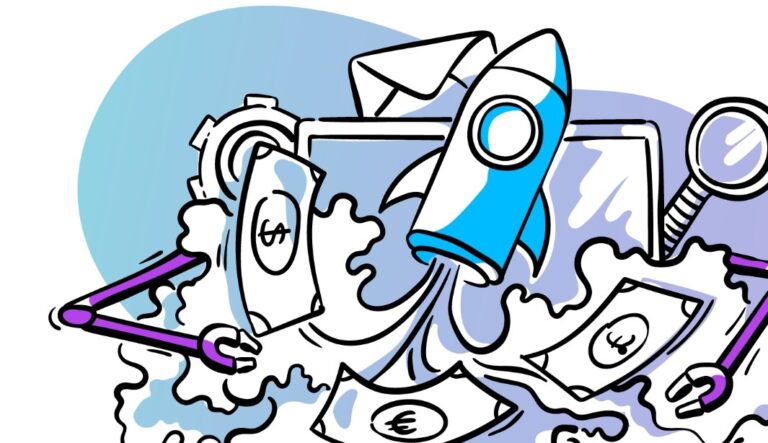Top 5 Industries with The Fastest Growth in The Next Decade
The world’s economy is evolving at a rapid pace, with certain industries predicted to grow exponentially over the next ten years. By understanding these trends, businesses, investors, and individuals can capitalize on opportunities in fields with high potential returns. This article highlights the five industries set to experience the fastest growth, explains why they are thriving, and discusses key products, use cases, and how they can benefit society.
Industry 1: Technology and Artificial Intelligence

The technology industry, particularly artificial intelligence (AI), has been reshaping how we live and work in profound ways. Over the next decade, AI is anticipated to continue its rapid growth, impacting sectors such as healthcare, finance, customer service, and manufacturing. This growth is fueled by advancements in machine learning, data analytics, natural language processing, and robotics. As AI technology matures, it promises to drive efficiency, personalization, and improved decision-making capabilities across diverse industries. Here’s a deeper dive into the potential of AI, the benefits it brings, and key products leading the way.
Growth Potential and Key Trends in AI
Artificial intelligence has transitioned from a niche research field to a mainstream industry cornerstone. Key advancements propelling AI growth include:
- Machine Learning (ML) and Deep Learning: These are subfields of AI where computers learn patterns from data to make predictions or decisions without human intervention. Machine learning algorithms are now used in recommendation engines, fraud detection, and predictive maintenance across sectors.
- Natural Language Processing (NLP): NLP enables machines to understand and respond to human language, facilitating applications such as chatbots, voice-activated assistants, and language translation. With AI language models like ChatGPT, companies are now able to offer highly responsive customer service and tailored content generation.
- Computer Vision: AI-driven computer vision allows systems to interpret and make decisions based on visual data, which is used in fields like healthcare (for medical imaging), security (for surveillance), and retail (for self-checkout systems).
Real-World Examples of AI Products
As AI applications continue to expand, certain products have emerged as front-runners in their respective fields, bringing innovative solutions to complex problems. Below are some key examples of AI products that exemplify the industry’s growth and potential.
1. OpenAI’s ChatGPT
- Insert image of the product
- Website: ChatGPT
ChatGPT, developed by OpenAI, is a conversational AI tool that uses deep learning to generate human-like responses. This product has various applications, from customer service support to content creation, data analysis, and creative brainstorming. Businesses worldwide leverage ChatGPT for cost-effective and efficient customer engagement, allowing employees to focus on higher-value tasks.
- Use Case: In customer service, ChatGPT enables companies to handle common inquiries quickly, enhancing customer satisfaction and reducing response times.
- Pros: The platform adapts to a wide array of use cases, has continuous learning capabilities, and is versatile in many domains.
- Cons: Data privacy and security concerns are common, as chatbots often interact with sensitive customer information.
- Price: ChatGPT offers tiered pricing, including a free tier and premium options for advanced functionalities.
2. Google Cloud AI
- Insert image of the product
- Website: Google Cloud AI
Google Cloud AI provides a suite of machine learning and AI tools designed for developers and businesses. The platform includes tools for image analysis, natural language understanding, translation, and data analysis, enabling companies to build intelligent applications tailored to their specific needs.
- Use Case: Google Cloud AI is widely adopted in retail and finance industries to improve customer insights through data analytics, personalize marketing efforts, and streamline inventory management.
- Pros: The platform offers robust scalability and integration capabilities, with extensive support for different industries.
- Cons: Integration complexity can be challenging for businesses without technical expertise.
- Price: Google Cloud AI’s pricing varies based on usage, data storage, and processing needs, making it accessible for small to large-scale applications.
3. IBM Watson
- Insert image of the product
- Website: IBM Watson
IBM Watson is an enterprise-grade AI system known for its advanced natural language processing and machine learning capabilities. Watson has applications in fields like healthcare, finance, and government, helping organizations leverage data to make better, data-driven decisions. For instance, Watson’s Health division aids in oncology and genetic research by analyzing medical data for personalized treatment options.
- Use Case: In healthcare, IBM Watson supports doctors by analyzing patient records, research papers, and clinical trial data to suggest possible treatment plans.
- Pros: Watson is highly customizable, supports enterprise applications, and has proven accuracy in data analysis.
- Cons: It requires a high level of technical expertise for setup and ongoing maintenance.
- Price: IBM Watson offers tailored pricing based on the specific services used, with both cloud-based and on-premises options.
Benefits of AI in Technology and Business
The applications of AI reach nearly every sector, enabling unprecedented growth and efficiency. Here are some notable benefits:
- Enhanced Productivity and Efficiency: Automation through AI allows businesses to streamline tasks, reducing manual workload and enabling employees to focus on more strategic, value-added activities. In manufacturing, for example, AI-driven robotics can manage repetitive tasks, maintaining productivity without compromising on quality.
- Improved Decision-Making: AI offers data-driven insights that lead to more accurate and faster decision-making. In financial services, predictive analytics help institutions understand trends and customer behaviors, reducing risk and improving customer service.
- Personalization: AI helps tailor products, services, and marketing efforts to individual preferences. In retail, for instance, machine learning algorithms can predict customer needs and offer personalized recommendations, enhancing customer satisfaction and increasing sales.
Challenges and Considerations with AI
While AI promises significant advantages, there are challenges to address:
- Data Privacy and Security: AI systems often require large amounts of data, raising concerns about data protection and privacy. For example, customer service chatbots handle sensitive information that must be securely stored and managed.
- Ethical and Regulatory Concerns: AI use raises questions about ethical considerations, including bias in algorithms and the potential impact on jobs as more tasks become automated. Regulatory frameworks are continually evolving to address these issues.
Use Cases: Solving Real-World Problems with AI
Problem Solved
AI technology addresses several critical challenges, such as reducing the time needed for complex decision-making, improving the accuracy of diagnoses in healthcare, and enabling businesses to enhance customer engagement through personalized interactions.
Why People Need AI
AI has the power to make complex processes more efficient and accessible. In the financial industry, for example, AI tools like fraud detection systems analyze transactions in real time to identify unusual patterns, helping banks and customers stay secure.
Where to Buy and How to Buy AI Products
Purchasing AI solutions typically involves a subscription or cloud-based pricing model through the provider’s official website. For instance, Google Cloud AI and IBM Watson provide comprehensive information on their sites, where businesses can explore pricing tiers and product features. These platforms also offer free trials or consultations for businesses to assess their needs before committing.
For enterprise solutions such as IBM Watson, it’s best to consult with the sales team directly for a tailored quote. Alternatively, products like Google Cloud AI can be purchased directly online with scalable pricing based on your data processing needs.
Industry 2: Renewable Energy

Growth Potential and Key Trends
Renewable energy, including solar, wind, and hydro power, is expected to see unprecedented growth due to increased environmental concerns and government policies favoring clean energy. The global shift toward sustainability is driving innovation in this sector.
Key Products and Real-World Examples
- Insert image of the product:Tesla Solar Panels
- Tesla Solar Panels: Residential solar panel systems that offer clean, renewable energy.
- Use Case: Enables homeowners to reduce energy costs and carbon footprint.
- Pros: Cost-effective in the long term, environmentally friendly.
- Cons: High initial investment.
- Price: Varies based on installation size.
- Insert image of the product:Siemens Gamesa Wind Turbines
- Siemens Gamesa: Large-scale wind turbines for both onshore and offshore power generation.
- Use Case: Used by utility companies to provide sustainable energy.
- Pros: Scalable, significant energy output.
- Cons: High maintenance and land requirements.
- Price: Customized pricing based on location and capacity.
Benefits of Renewable Energy
- Environmental Sustainability: Reduced greenhouse gas emissions and dependence on fossil fuels.
- Long-Term Cost Savings: Investments in renewable energy provide cost efficiency over time.
Industry 3: Health and Wellness

Growth Potential and Key Trends
The health and wellness industry is booming, driven by a global focus on well-being, fitness, and mental health. Products in this industry range from fitness technology to health tracking apps.
Key Products and Real-World Examples
- Insert image of the product:Fitbit Wearables
- Fitbit: Health-tracking devices that monitor heart rate, sleep, and physical activity.
- Use Case: Widely used by individuals and health professionals for monitoring vital signs.
- Pros: User-friendly, integrates with mobile apps.
- Cons: Limited battery life.
- Price: Ranges from $100 to $300.
- Insert image of the product:Peloton Bike
- Peloton Bike: High-end stationary bike with live-streamed workout classes.
- Use Case: Offers a home-based fitness solution for individuals with busy schedules.
- Pros: Comprehensive fitness solution, social community features.
- Cons: Expensive initial cost.
- Price: Around $2,000 with monthly subscription options.
Benefits of Health and Wellness Products
- Improved Lifestyle: Wearables and fitness tools help users maintain healthy habits.
- Preventative Healthcare: Early detection of health issues through continuous monitoring.
Industry 4: E-commerce and Logistics

Growth Potential and Key Trends
E-commerce has surged in the past decade, leading to rapid growth in the logistics industry. Companies are adopting innovative solutions to manage supply chains efficiently and meet growing consumer demands.
Key Products and Real-World Examples
- Insert image of the product:Amazon’s Fulfillment by Amazon (FBA)
- FBA: End-to-end fulfillment service that allows sellers to store, pack, and ship products through Amazon.
- Use Case: Eases logistics for small and medium-sized businesses.
- Pros: Efficient, access to Amazon’s customer base.
- Cons: Fees can be high for large items.
- Price: Based on storage and shipping volume.
- Insert image of the product:Shopify’s Shipping Solutions
- Shopify: Integrated shipping service that helps e-commerce businesses streamline their logistics.
- Use Case: Simplifies order management and shipping for online stores.
- Pros: Easy integration, competitive rates.
- Cons: Limited to Shopify platform.
- Price: Varies based on shipping needs.
Benefits of E-commerce and Logistics Solutions
- Global Reach: Enables businesses to serve customers worldwide.
- Efficient Fulfillment: Streamlined shipping processes reduce delivery times.
Industry 5: Financial Technology (FinTech)

Growth Potential and Key Trends
FinTech has reshaped the financial services industry by offering innovative solutions such as mobile payments, blockchain, and digital banking. It’s expected to keep growing as consumers embrace digital financial services.
Key Products and Real-World Examples
- Insert image of the product:Square Point of Sale (POS)
- Square POS: Mobile payment solution for small and medium businesses.
- Use Case: Allows vendors to accept payments anywhere, increasing sales.
- Pros: User-friendly, supports multiple payment methods.
- Cons: Transaction fees.
- Price: Free app with per-transaction fees.
- Insert image of the product:Robinhood Trading App
- Robinhood: Investment platform with commission-free trading.
- Use Case: Provides affordable access to stock markets for new investors.
- Pros: No fees, easy to use.
- Cons: Limited advanced trading features.
- Price: Free with optional premium account.
Benefits of Financial Technology Products
- Accessibility: Makes financial services accessible to a broader audience.
- Efficiency: Reduces the need for physical bank visits, enhancing convenience.
How to Buy and Where to Buy
To buy AI solutions like ChatGPT, Google Cloud AI, and IBM Watson, businesses have various options tailored to their needs and budget. Most AI providers operate on a subscription or usage-based model, which allows flexibility in scaling services up or down based on demand. Here’s a step-by-step guide:
- Identify Requirements: Determine the specific AI applications your business needs, such as natural language processing, data analytics, or customer service automation. This helps in selecting the most suitable AI tool.
- Choose the Provider: Visit the official websites of top providers like OpenAI for ChatGPT, Google Cloud AI for Google’s suite of AI tools, and IBM Watson for enterprise applications. Each site offers detailed product descriptions and pricing structures.
- Explore Pricing Options: AI platforms often provide tiered pricing to match different usage levels. Google Cloud AI and IBM Watson offer pay-as-you-go models, while ChatGPT includes monthly and annual subscriptions.
- Sign Up and Customize: Register directly on the platform’s website and configure your account based on project requirements. Many platforms offer trial periods or free consultations for initial assessment.
- Finalize and Purchase: Complete the purchase on the website. Larger organizations may benefit from direct consultation with the provider’s sales team to customize and optimize their AI deployment.
Frequently Asked Questions (FAQs)
1. What are the fastest-growing industries in the next decade?
The fastest-growing industries include Technology and AI, Renewable Energy, Health and Wellness, E-commerce and Logistics, and Financial Technology.
2. Why are these industries growing so quickly?
The demand for sustainability, convenience, and digital transformation fuels growth, as these industries offer innovative solutions to meet evolving needs.
3. Can small businesses benefit from investing in these sectors?
Yes, small businesses can greatly benefit by integrating solutions from these sectors to streamline operations, improve customer satisfaction, and gain a competitive edge.






